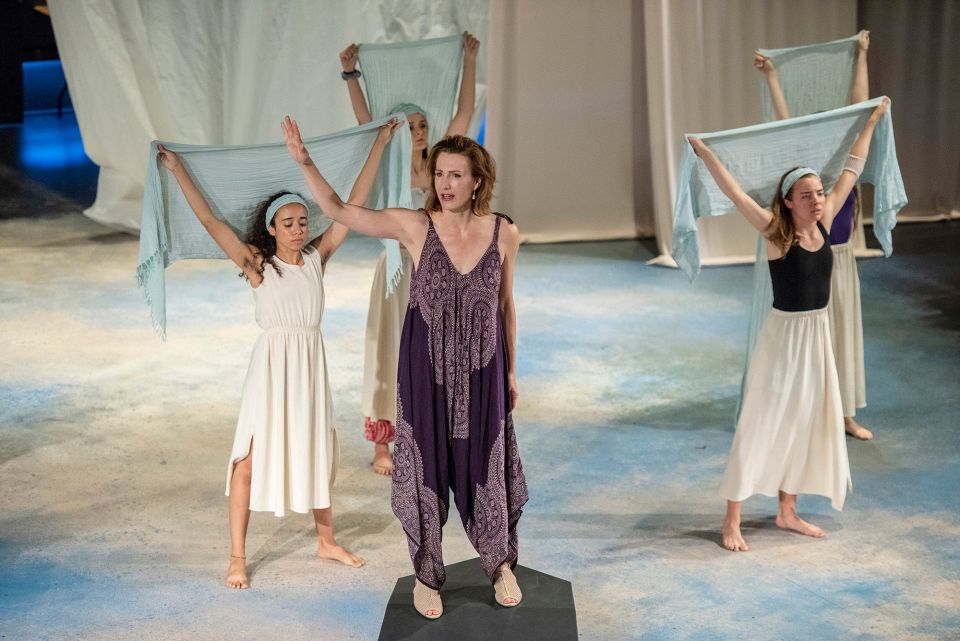In a new adaptation of two plays by Euripides, the Stanford Repertory Theater presents the stories of women on opposite sides of the Trojan War – Hecuba of Troy, a fallen queen facing a life of slavery, and Helen of Sparta, a renowned beauty plotting a reunion with her long-lost husband.
Go to the web site to view the video.
Euripides, a playwright of ancient Athens who drew on Greek mythologies to address the pressing issues of the time, wrote one play about Hecuba and another about Helen.
Rush Rehm, a professor of classics and of theater and performance studies in the School of Humanities and Sciences, brings the iconic heroines together for the first time in Hecuba/Helen, the centerpiece of the repertory theater’s summer festival.
“Stanford Repertory Theater is celebrating its 20th anniversary and we thought the right thing to do to mark the occasion was to go back to the Greeks, and to Euripides, who combines passionate tragedy with a surprising sense of comedy,” said Rehm, who is the author of Understanding Greek Tragic Theatre.
“In the stories of Hecuba and Helen, Euripides created strong female protagonists who persist and resist male patriarchy, who seize control of their destinies in startling ways and who triumph over the men who try to dominate them. Hecuba and Helen embody female resistance, though each one does so in a different way.”
One actress, two roles
In Hecuba/Helen, Courtney Walsh, a professional actress who has worked with Stanford Repertory Theater for more than a decade, plays both title roles. On stage, she transforms from Hecuba, a barefoot widow in ragged black clothing, into Helen, a glamorous woman in a bright blue dress, earrings and heels.
“Hecuba is straight-up tragedy,” said Walsh, who collaborated with Rehm on the new adaptation. “It’s a harsh story, beautifully written in tight, taut language. Helen is more lyrical and poetic, and it’s sexy, with moments of great humor.”

Courtney Walsh also plays the role of Helen in this adaptation of two plays by Euripides. (Image credit: L.A. Cicero)
Walsh said both women, as well as the all-female choruses, live in a male-dominated world in which women are presumed to be powerless and useless. Each woman proves that notion wrong: Hecuba takes revenge for the deaths of her children, and Helen, who languishes in Egypt for years thinking her warrior husband is dead, plans their escape when he reappears.
The power of women isn’t the only theme in the play.
“Hecuba/Helen also raises questions about war – what we fight for, what we thought we were fighting for, for whom, for what reason and what happens afterward,” Walsh said. “What you’re left with at the end of war are the bystanders, the victims of the wars of men. In Euripides’ plays, these two women had nothing to do with starting the Trojan War, but they had everything to do with its aftermath.”
Joe Estlack, a professional actor, plays three roles: Polymnestor, who murders Hecuba’s son during the Trojan War; Odysseus, who fetches Hecuba’s daughter to be sacrificed after the war; and Menelaus, Helen’s warrior husband.
Immersion in professional theater
Rehm said the summer festival offers students the extraordinary opportunity to work alongside professionals – actors as well as lighting, sound, choreography, set and costume designers – while receiving a full stipend for the summer work, thanks to funding from the Office of the Vice Provost for Undergraduate Education.
Rehm said the students play central roles in the production.
“One of our undergraduate students is working with Michael Keck, a composer and sound designer from New York who created an amazing soundscape for the play,” he said. “Another student is working as a costume assistant with Connie Strayer, a senior lecturer in theater and performance studies who designed the set and costumes for Hecuba/Helen.”
Six Stanford students make up the chorus in Hecuba/Helen, including Lea Claire Zawada, a senior communication major who also plays Polyxena, the youngest daughter of Hecuba.
Amber Levine, another member of the chorus, is also serving as assistant to Aleta Hayes, a lecturer in theater and performance studies who is the choreographer of Hecuba/Helen. The choruses contribute gesture, movement, words and song to the stories as they unfold.
“Aleta’s choreographic style is exciting because dancers always get to be a part of her creative process,” said Levine, who recently finished her senior year in architectural design, with a minor in dance, and is returning this fall as a master’s student in management science and engineering.
Levine is one of eight students serving as assistants to the festival’s artistic staff.
“Before this summer, I never thought about the fact that sometimes acting can have the weirdest hours,” Levine said with a laugh. “This summer, I tell my friends, ‘Oh no, I’m not available evenings, but if you want to do anything on weekdays before two in the afternoon – when rehearsal begins –I can do that.’”
After Hecuba/Helen’s Stanford run, Stanford Repertory Theater will remount the production in September in Athens, the city of the story’s origin.
Hecuba/Helen opens at 8 p.m. Thursday, July 26, in Roble Studio Theater, on Santa Teresa Street on the west side of campus. Performances will be held at 8 p.m. Thursday through Saturday, and at 2 p.m. on Sunday, through Aug. 19. Tickets are available online; by phone, (650) 725-5838; and by mail, Stanford Repertory Theater, 551 Serra Mall, Stanford, CA 94305-5010. Tickets are $15 for students and seniors, and $25 for general admission.